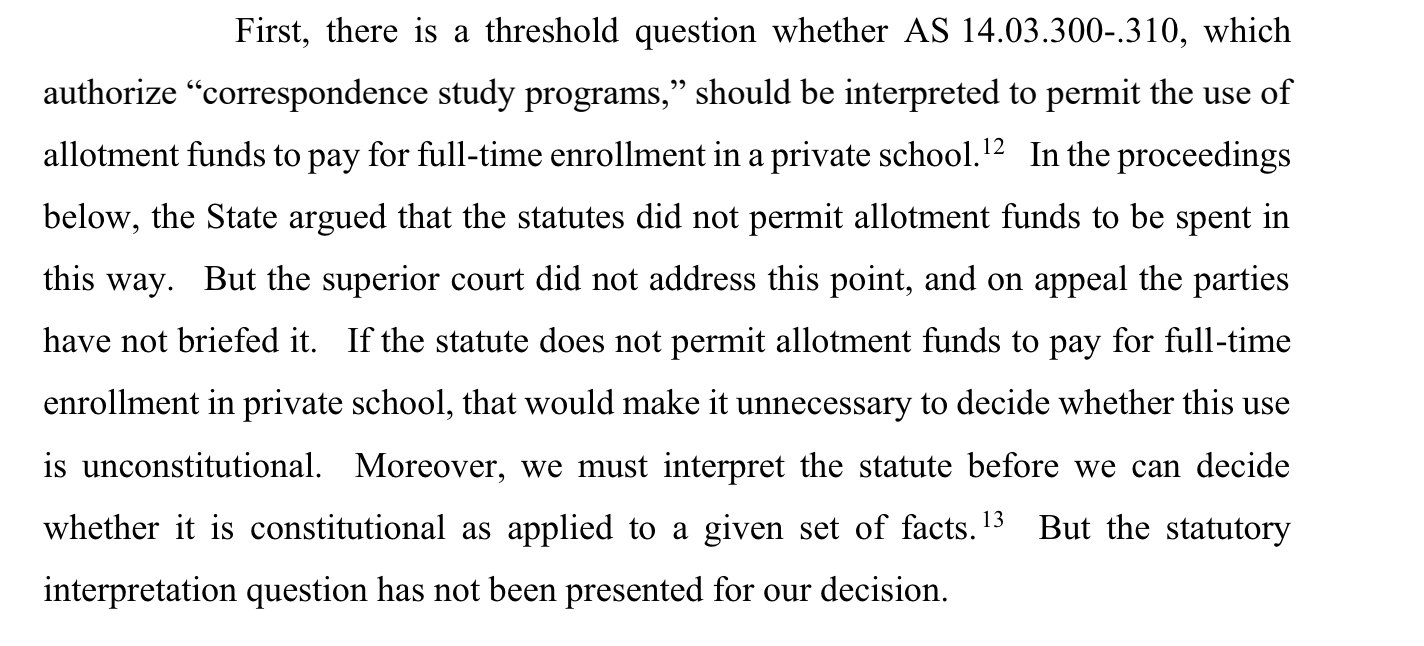Alaska Supreme Court overturns lower court correspondence ruling, while delaying decision on using public funds for private tuition
The Alaska Supreme Court preserved state correspondence programs in their current form Friday, while declining to rule just yet on the key question of using public funds to pay for private school tuition.
One day after oral arguments in the appeal of a landmark school funding case, the Supreme Court overturned a decision by Superior Court Judge Adolf Zeman that struck down the correspondence school program as a violation of the Alaska Constitution. The court remanded the case to Zeman for further proceedings.
Here is the eight-page summary opinion from the court.
The five justices accepted the contention by the Dunleavy administration that since there are many constitutional uses of allotments, the underlying law should be allowed to stand.
The court also agreed that if unconstitutional spending is taking place with allotments, the school districts have to be parties to a lawsuit because state law gives districts the power to oversee the spending.
The most likely step now is for the plaintiffs to challenge one or more of the school districts that are allowing public allotment money to be used to pay for private school tuition. The districts in Fairbanks, the Denali Borough and Mat-Su are among those that have allowed public funds to be spent on private school tuition. Each district has its own rules and there is no state oversight.
Gov. Mike Dunleavy said Friday that, “The court got it right on this one. We were confident that the statutes were always constitutional.”
Contrary to that assessment, nothing in the Supreme Court ruling Friday can be read as an endorsement of spending public funds for private school tuition—the central point of contention. The opposite is the case.
The Supreme Court seems to believe that Attorney General Tregarrick Taylor has already agreed that the existing law bans school districts from allowing parents to use public funds for private tuition. But school districts are doing just that.
The Supreme Court said “the state argued that the statutes do not permit allotment funds to be spent” to pay for full-time enrollment in a private school.
The court added that “the Superior Court did not address this point, and on appeal the parties have not briefed it. If the statute does not permit allotment funds to pay for full-time enrollment in a private school, that would make it unnecessary to decide whether this issue is unconstitutional,” the court wrote.
While the contract attorney hired by the state for $650 an hour, Elbert Lin, almost declared that spending public funds on private tuition is unconstitutional Thursday—he hemmed and hawed at length—the state’s legal position on this has changed multiple times over the past two years.
Questioned Thursday in court about whether using public funds for private school tuition is OK, Lin never gave a clear answer.
“I think there is a real question as to whether full-time private tuition could be covered under the statute. I think you’ve got to look at . . . I can’t answer the question directly, categorically for you because I think it depends on the facts that you’re talking about,” Lin said.
A bit later, Lin said, “The state agrees, I think that the purpose of the statute is for public education. And as you probably have read in the attorney general opinion that was issued before this lawsuit, the state took the position that using student allotments for full-time private tuition is almost certainly unconstitutional if it were to survive a statutory review. And we stand by those statements, but I cannot give you a categorical answer because I really do think it depends on the factual record in an individual circumstance because you’ve got kids and students in very different situations throughout the state. There are some correspondence students here in the City of Anchorage, but you’ve also got students way out in rural areas that have no access to brick-and-mortar schools and may for their own individual reasons have an individual learning plan that says whatever it is that we can’t really imagine hypothetically. So I think consistent with this court’s case law you should . . .”
The Alaska Supreme Court engaged in wishful thinking by concluding from that monologue that the Dunleavy administration “argues” that using public funds for private school tuition is against the law.
The next step in this case should lead to new scrutiny on whether the attorney general played a part in the successful lobbying campaign of his wife, Jodi Taylor, to get a former Anchorage charter school to change its policies and allow for public funds to be used for private tuition—the opposite of the attorney general’s current opinion, according to the Alaska Supreme Court.
To read more, here is the Alaska Beacon coverage, in which plaintiffs attorney Scott Kendall says the decision
Friday was more about procedure and process than anything else.
“I am not a betting man, but if I was, I would bet big money on the fact that you cannot constitutionally spend public funds through a correspondence program for tuition at a private school,” he told the Beacon. “It’s just going to take us just a bit longer to reach that ultimate outcome.”
The Anchorage Daily News also has good reporting on the case. Kendall told the ADN that he expects a final decision on the main question before this time next year. The attorney general called the ruling, “a win for the rule of law.”
Your contributions help support independent analysis and political commentary by Alaska reporter and author Dermot Cole. Thank you for reading and for your support. Either click here to use PayPal or send checks to: Dermot Cole, Box 10673, Fairbanks, AK 99710-0673.
Write me at dermotmcole@gmail.com.
From the Alaska Supreme Court decision Friday that remanded the school case to Anchorage Superior Court.

